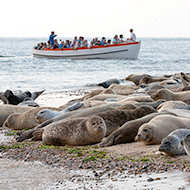
The new campaign aims to protect coastal wildlife this summer.
The RSPCA is rolling out a national campaign to prevent people from behaving irresponsibly around marine animals.
Alongside the police, and other partner organisations, the RSPCA launched its national campaign, Operation Seabird, on Friday 4 June. The campaign aims to combat common disturbances to marine wildlife, such as speedboats, kayaks, and paddleboards deliberately getting to close to marine animals and causing them unnecessary and dangerous stress.
Other issues the campaign aims to highlight include off-lead dogs causing disturbances to nesting birds or seals, litter severely injuring seals, beach barbecues and camp fires causing significant damage on the beach, and quad bikes or 4x4 vehicles riding over nesting areas. There is particular concern that members of the public sometimes get too close to wild animals in order to take a selfie picture with them.
The Operation Seabird campaign, initially piloted in 2020 in regional hotspots, aims to raise awareness of these problems, and to educate the public on the importance of leaving the mammals and birds of Britain's coastal areas alone. The campaign encourages people to enjoy watching the animals from afar instead.
Geoff Edmond, the national wildlife co-ordinator of the RSPCA, said: “We want people to enjoy watching our marine wildlife but this should be done at a safe and sensible distance without disturbing the animals.”
"Every year, the RSPCA's wildlife centres have to treat and rehabilitate a wide range of wildlife - including seals and seabirds - which have been injured or orphaned due to human disturbance.
For example, last year, in a particularly shocking incident, members of the public had to be held back by a cordon to stop them trying to take selfies and distressing an injured seal who was recovering on a beach on Hayling Island, West Sussex.
"If people have concerns about an animal, they should keep their distance and contact the RSPCA helpline on 0300 1234 999."
The campaign is urging people who intend to visit the coastline to maintain a significant distance from wildlife, read signs and stick to visible pathways, keep dogs on leads when instructed, and under no circumstances should they get close enough to touch animals or take selfies with them.
As the summer and holiday season begins, the RSPCA, local police forces, and wildlife groups will send out high visibility patrols to coastal areas where people and animals interact, and locations initially targeted include Humberside, North Yorkshire, Lincolnshire, Norfolk, Suffolk, and Essex.
Geoff Edmond added: “For many tourists it can be surprising and exciting to see marine mammals, including seals and their pups which will normally rest on the beach at various times of year, as well as ground nesting birds which are usually resident between March to September. But as tempting as it is to approach them, we would respectfully ask that everyone stays at a distance and keeps their dogs on leads and under control.”
"Our message is to 'Observe, Don't Disturb' as people visit Britain's wonderful coastline."



 The latest
The latest